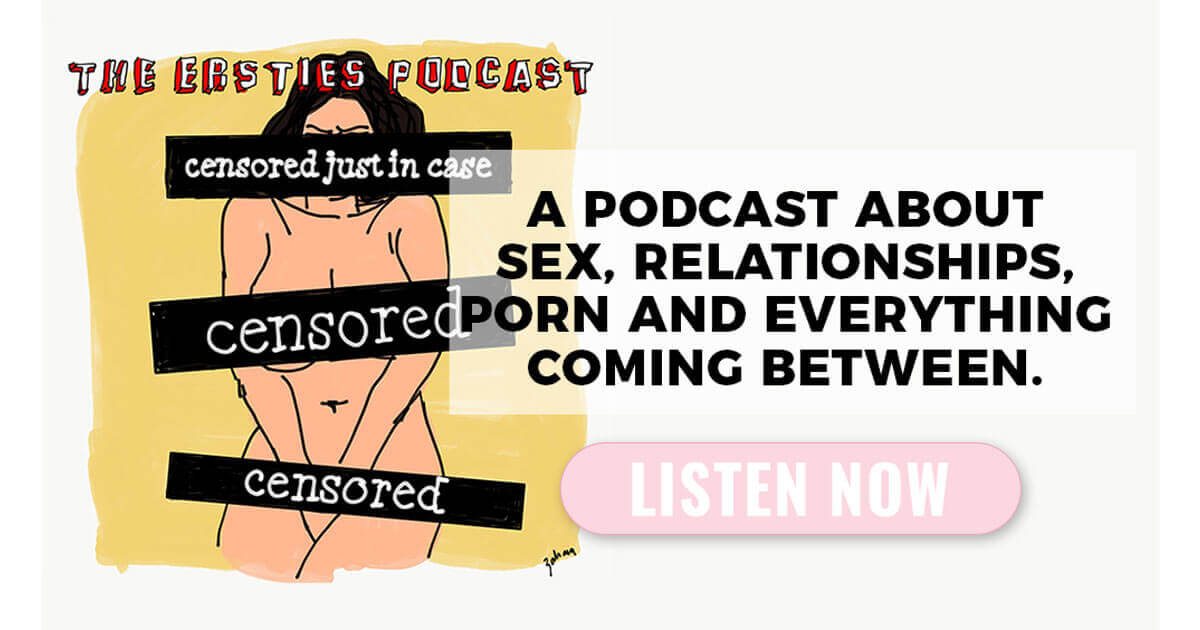What You Need to Know About the UK’s New Laws Against Online Pornography
Ersties Podcast takes on sex-negativity and the “Great British Firewall.”

With the Internet in the UK being censored under the Digital Economy Act, the presenters of the Ersties Podcast went to London to investigate the ramifications of the new legislation for British society and the adult entertainment industry.
What is the Digital Economy Act?
The Digital Economy Act 2017 (DEA) was created by the UK government to further legislate our digital spaces—it also includes updates on copyright law and illegal file sharing—and one of its main aims was to ensure that children are adequately protected online from unsuitable content.
This will be through the enforced introduction of an Age Verification Gateway on commercial pornographic websites. A 2016 study from the NSPCC (National Society for the Prevention of Cruelty to Children) found that 48% of children aged 11-16 had watched online pornography and that 28% of them may have accidentally stumbled across the content: just 19% of those surveyed admitted to purposefully seeking it out.
The survey created a kind of “moral panic” about online pornography and how easily accessible it is for children, but many critics did not take into account the survey’s reliability.
The children surveyed were reportedly in the presence of their parents, which surely would have affected the answers they supplied: it’s much easier to tell mum it was accident rather than to admit one was feeling a little intrigued last week.
The BBFC (British Board of Film Classification) has been designated as the regulator for the Age Verification Gateway and will have a number of steps it can take if commercial pornographic sites do not comply with the legislation.
The BBFC will first send a notice instructing the site to comply and introduce age verification and if this is ignored the organization can: contact advertisers and payment processors so that the income flow of the site is cut off, contact Internet Service Providers (ISPs) to block the site from being viewable in the UK, and enforce financial penalties on non-complying sites.

Pornography is prolific online—it makes up 36% of Internet content and one-third of all online searches—and it is undoubtedly not appropriate that it is so easily viewed by children.
Many of those that the Ersties Podcast interviewed agreed with the general premise that something has to be done to tackle this. However, there are certain areas where the DEA as a piece of legislation is sorely lacking solutions to the core issue: we don’t want our children to learn about sex solely from online pornography.
Firstly, it targets only ”commercial” pornography which leaves pornographic material on social media websites like Tumblr and Instagram unaffected and just as accessible to children.
Secondly, it inadvertently discourages parents from communicating with their children in a healthy way about sex: the government has taken that one for the team, they’ve blocked pornography for under 18s, we don’t need to worry about that anymore.
Thirdly there is section of the law which states that the regulator has the power to block any “extreme pornographic material” being viewed in the UK: but what constitutes extreme? The wording used is a little worrying—material deemed “offensive, disgusting or otherwise of an obscene character” can be blocked as “extreme.”
The definition of obscene, or offensive, is surely open to interpretation. What one person would be offended by may be entirely opposite to another. It also sets a dangerous precedent: the aspects of humanity we find unpalatable do not vanish just because they have been censored from the Internet.
Fundamentally the basis of the DEA is entirely reasonable—protect children online and block any illegal or non-consensually made material—but it has been written in such a way that it extends beyond these parameters and into a kind of paternalistic censorship.
How will Age Verification work?
Age Verification Gateways are set to be enforced from the end of 2018. The UK government and the BBFC have not specified how they must work, but instead are leaving the task up to the market.
Mindgeek—a company who owns all the major free tube websites and has what could be called a monopoly on online pornography—have created an age verification system called AgeID, which will most likely be the frontrunner due to the popularity of their sites.
Adult performer Pandora Blake told the ladies of Ersties Podcast they found this troubling because of the company’s long record of data breaches. Myles Jackman agreed, saying Mindgeek has “an extremely poor history of data security” and he raised the vital question:“Can people trust age verification suppliers to keep their private sexual proclivities safe?”.
James Clark, Director of Communications for AgeID, claims that the system will be entirely anonymized and that our data will be completely safe. However, the main issue for adult consumers with the AVG is still one of privacy: Do we want our personal data and our pornography preferences to be linked?
That kind of sensitive information having the potential to be leaked into the public domain could change the way adults in the UK consume pornography and relate to their own sexuality.

Censorship and sex negativity
The DEA is not the first example of the UK government censoring material it believes is inappropriate for its citizenry, nor is it likely to be the last, according to free speech activist Jerry Barnett.
The author of “Porn Panic,” Barnett said to Ersties Podcast that “fascist and dictatorial regimes have always clamped down on sexual freedom […] it’s a way to control social behaviors.”
Through the creation of an incredibly personal data profile of our sexual preferences, we may even begin to self-censor: staying firmly on the beaten and accepted mainstream path rather than acknowledging our own kinks and quirks as healthy and normal. Kink-shaming—from the government or ourselves—cannot help society raise open and healthy children who will grow up to understand consent and sex-positivity.
What next?
Over the course of the two-part special from Ersties Podcast, it becomes clear that the most important thing that must be changed is the way that parents in the UK communicate with their children about sex and the wide spectrum of sexual desire.
Even James Clark has agreed that the onus cannot be with AgeID, but with the parents themselves and that this law presents a danger that they may absent themselves of this important responsibility.
Ersties Podcast continually creates informative and topical episodes with the ladies striving to be radically honest and get to the heart of whatever issue they are covering. Recent episodes have included consent in BDSM and busting sex myths.
You can listen to the Ersties Podcast here or by searching “Ersties” wherever you listen to your podcasts—don’t forget to click subscribe! If you’d like to keep up to date with the four friends you wish you had you can follow them on Twitter here.
Image sources: Ersties Podcast
Leave a reply
You must be logged in to post a comment.

















